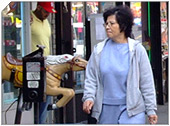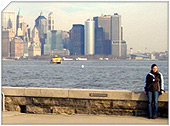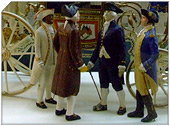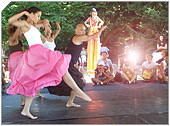Getting Started
Index
NYC Neighborhoods
Manhattan
Brooklyn
Queens
Bronx
Staten Island
NYC Icons
Chrysler Building
Flatiron Building
Empire State Building
Safe NYC
NYPD
FDNY
NYC Weather
NYC Climate
NYC Weather Forecast
Winter Season
Spring Season
summer Season
Fall Season
NYC History & Politics
New York City History
Tammany Hall and Politics
New York City Politicians
New York City Personalities
Culture of Gotham City
Culture of the city
Cultural diversity
City in popular culture
|
Mario Gianluigi Puzo (October 15, 1920 - July 2, 1999) was an American author known for his novels about the Mafia, especially The Godfather (1969).
Life
Puzo was born into a poor family of Sicilian immigrants living in the Hell's Kitchen neighborhood of New York City. Many of his books draw heavily on this heritage. After graduating from the City College of New York, he joined the United States Army Air Forces in World War II. Due to poor vision, the military did not let him undertake combat duties but made him a public relations officer stationed in Germany. After the war, he wrote his first book, The Dark Arena, which came out in 1955.
His most famous work, The Godfather, was first published in 1969 after he had heard anecdotes about Mafia organizations during his time in pulp journalism.
The Godfather was later developed into a trilogy of films directed by Francis Ford Coppola released in 1972, 1974 and 1990. Although the first two were popular and highly acclaimed, the third, "The Godfather Part III", was not as popular and was somewhat poorly received by critics and audiences.
In addition to co-writing the screenplay with Coppola, Puzo wrote the first draft of the script for the 1974 disaster film Earthquake, which he was unable to continue working on due to his commitment to "The Godfather: Part II." Puzo also co-wrote Richard Donner's Superman (1978) and the original draft for Superman II (1980).
Puzo never saw the publication of his penultimate book, Omertà, but the manuscript was finished and so became his last work. This was also the case with his final book, The Family, in the Fall of 2001. In a review originally published in the San Francisco Chronicle, Jules Siegel, who had worked closely with Puzo at Magazine Management Company, doubted that Puzo had actually finished Omertà and expressed the view that it may have been completed by "some talentless hack."
Puzo died of heart failure on July 2, 1999 at his home in Bay Shore, Long Island, New York. Until his dying day, he considered The Fortunate Pilgrim (1965) his finest, most poetic and literary work. In one of his last interviews, he stated that he was saddened by the fact that The Godfather, a fiction he never liked, outshone the novel of his mother's honest immigrant struggle for respectability in America, and her courage and filial love, as portrayed in The Fortunate Pilgrim. Although it won much literary praise from established American novelists, it never earned Puzo a living. It was only when he opted for what Hollywood sold well to America-the stereotype of Italian immigrants as mobsters-that Puzo's fame rose to the height of his fortunes as a writer.
|
New York City Search
Quick NYC
|



 New York Weather Forecast
New York Weather Forecast
 Ethnic composition
Ethnic composition


















